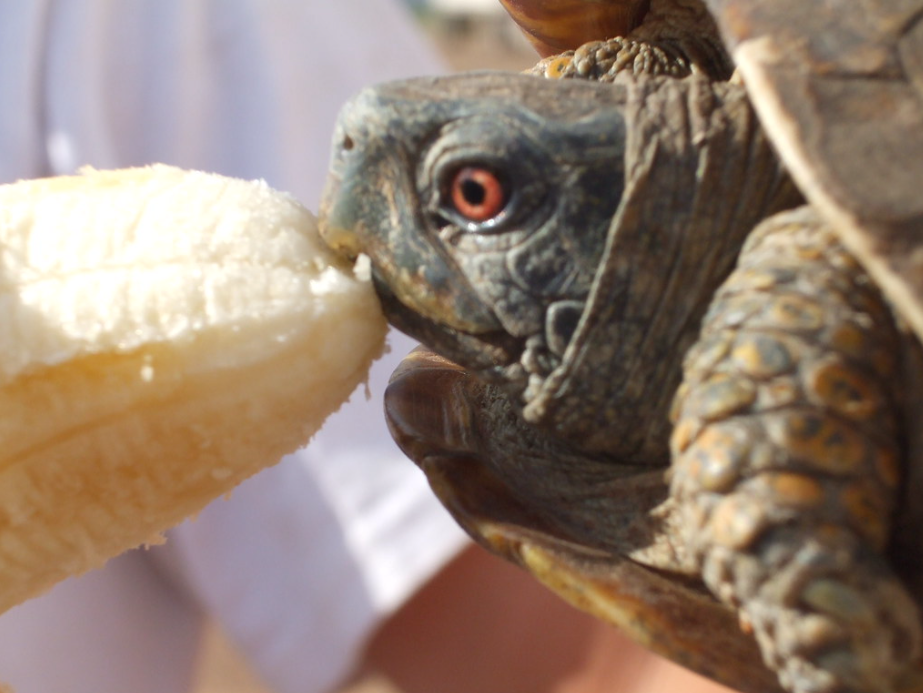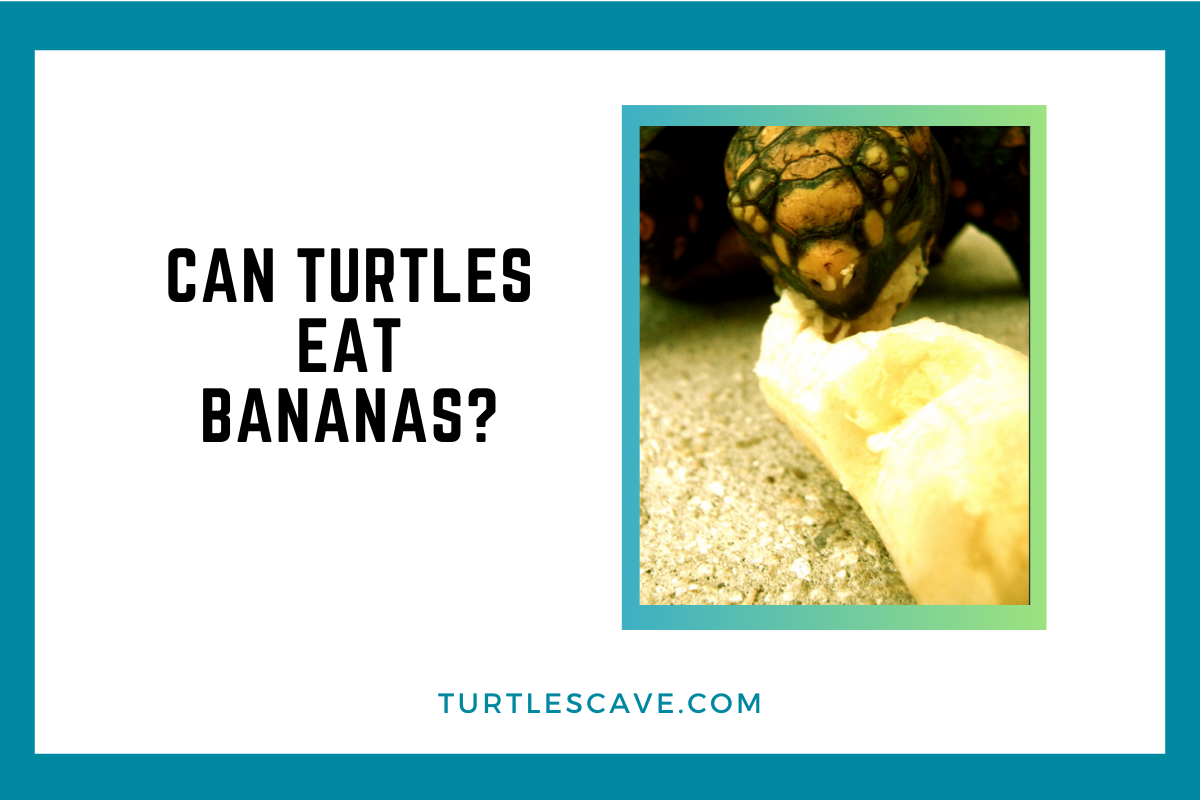Yes, turtles can eat bananas. Bananas provide a nutritious source of vitamins and minerals for turtles, making them a suitable addition to their diet.
One common question that turtle owners often ask is whether turtles can eat bananas. In short, the answer is yes. Bananas are safe and healthy for turtles to consume in moderation. They provide an array of essential nutrients, including potassium, fiber, and vitamins b6 and c. however, it’s important to note that bananas should be offered as a treat rather than a staple food in a turtle’s diet. In this article, we will explore the reasons why turtles can eat bananas and how to properly incorporate them into their meals.

Credit: Bryan Dougherty
The Diet Of Turtles
Overview Of Turtle’S Dietary Preferences
Turtles are fascinating creatures that have unique dietary preferences. Understanding what these reptiles eat is crucial for their well-being in captivity and in the wild. The diet of turtles primarily consists of vegetables, leafy greens, and a small amount of protein.
While they are not traditionally known to eat fruits, some species benefit from including certain fruits in their diet.
Inclusion Of Fruits In A Turtle’S Diet
Including fruits in a turtle’s diet can provide added nutrients and variety. However, it’s important to select the right fruits that are safe and beneficial for them. Here are some key points to consider:
- Fruits should only make up a small portion of a turtle’s diet, typically around 10%.
- Fruits that are low in sugar and high in fiber are the best options for turtles. These include strawberries, blueberries, raspberries, and melons.
- It is crucial to remove any seeds, pits, or skins from fruits before feeding them to turtles. These parts can be harmful and cause digestive issues.
- Always offer fruits in moderation, as excessive consumption can lead to health problems such as obesity and nutrient imbalances.
- Turtles may have specific preferences when it comes to fruits. It is important to observe their individual reactions and adjust their diet accordingly.
Debunking The Myth About Turtles And Bananas
There is a common misconception that turtles can eat bananas. However, this myth needs to be debunked as bananas are not suitable for turtles. Here’s why:
- Bananas are high in sugar and carbohydrates, which can be harmful to turtles. Their digestive system is not designed to process large amounts of these nutrients.
- The high sugar content in bananas can disrupt the balance of a turtle’s gut flora, leading to digestive issues.
- Bananas have a soft and mushy texture, which may cause problems for turtles since their natural diet consists of foods with a harder texture.
- Feeding turtles excessive amounts of bananas can result in vitamin and mineral deficiencies, as they do not provide a well-rounded nutritional profile.
It is important to remember that turtles have specific dietary needs and preferences. Providing them with a balanced and varied diet is crucial for their overall health and well-being.
The Nutritional Needs Of Turtles
Understanding The Nutritional Requirements Of Turtles
Turtles, just like humans, need a well-balanced diet to thrive and stay healthy. Proper nutrition is essential for their growth, development, and overall well-being. Let’s take a closer look at the nutritional needs of turtles.
- Turtles require a varied diet consisting of both animal and plant matter. This helps provide them with the necessary nutrients for their growth and bodily functions.
- A balanced diet for turtles should include a combination of proteins, vitamins, minerals, and fiber.
- It’s important to note that different species of turtles may have slightly different dietary requirements. Therefore, it’s crucial to understand the specific needs of your turtle species.
- A diet lacking in essential nutrients can lead to various health issues in turtles, such as malnutrition, shell deformities, and weakened immune systems.
Importance Of A Balanced Diet For Turtles
Maintaining a balanced diet is crucial for turtles to lead happy and healthy lives. Here are some reasons why a balanced diet is important for turtles:
- Growth and development: Adequate nutrition is necessary for turtles, especially young ones, to grow and develop properly. Nutrients such as protein help in muscle and bone development, ensuring healthy growth in turtles.
- Shell health: A well-balanced diet rich in calcium is essential for maintaining the strength and integrity of a turtle’s shell. Calcium deficiency can lead to soft, weak shells that are prone to injuries and infections.
- Immune system support: Turtles with a well-nourished immune system are better able to fight off infections and diseases. A balanced diet provides the necessary vitamins and minerals to support optimal immune function.
- Energy and vitality: A diet that meets a turtle’s nutritional needs ensures they have the energy they require for activities such as swimming, basking, and exploring their environment.
Exploring The Nutrients In Bananas And Their Relevance To Turtles
Bananas are a popular fruit enjoyed by many, but can turtles eat them? Let’s dive into the nutritional value of bananas and how they can fit into a turtle’s diet:
- Nutrient profile: Bananas are a rich source of vitamins, including vitamin c, vitamin b6, and potassium. They also provide some dietary fiber, which aids in digestion.
- Moderation is key: While bananas can be a healthy treat for turtles, they should be fed in moderation. This is because bananas are high in natural sugars, which can lead to weight gain and potential health issues if consumed excessively.
- Supplementing a diet: Bananas can be offered as an occasional treat or as part of a varied diet. They can provide turtles with additional vitamins and minerals, particularly vitamin c and potassium.
- Preparation and serving: Turtles can be offered small, bite-sized pieces of ripe banana. It’s important to remove the peel and clean the fruit thoroughly before serving it to your turtle.
- Variety is crucial: Remember that bananas should not replace the staple foods and vegetables that make up the majority of a turtle’s diet. They should be viewed as a supplementary treat to provide additional nutrients and variety.
While bananas can be a tasty and nutritious addition to a turtle’s diet, it’s crucial to offer them in moderation and as part of a balanced meal plan. If in doubt about your turtle’s dietary needs, consult with a veterinarian experienced in reptile nutrition for personalized guidance.
Remember to prioritize a varied and nutrient-rich diet to ensure your turtle’s optimal health and well-being.
Can Turtles Safely Consume Bananas?
Examining The Safety Concerns Of Feeding Turtles Bananas
Turtles are fascinating creatures that have unique dietary needs. A common question that arises is whether turtles can safely consume bananas. Let’s delve into this topic and explore the potential risks and impact of bananas on a turtle’s digestion.
Impact Of Bananas On A Turtle’S Digestion
Bananas can provide turtles with some nutritional benefits, but it’s essential to consider the potential impact on their digestion. Here are key points to keep in mind:
- Bananas are high in sugar content, which may not be suitable for all turtle species. Too much sugar can lead to weight gain, obesity, and related health issues.
- Banana peels are challenging for turtles to digest. They can cause blockages in their digestive tracts, leading to discomfort and potential health complications.
- The high fiber content in banana peels might be beneficial for certain turtle species, as it aids in their digestion. However, this needs to be offered in moderation and under proper supervision.
It is crucial to consider the unique dietary needs of your specific turtle species. Consult with a reptile veterinarian or a specialist in turtle nutrition to determine if bananas are a suitable addition to their diet.
The Potential Risks Associated With Feeding Turtles Bananas
While bananas may seem like a tasty treat for turtles, there are some potential risks involved. Consider the following points:
- Turtles have specific dietary requirements, and an imbalanced diet can lead to health problems. Feeding too many bananas can result in nutritional deficiencies due to the lack of variety in their overall diet.
- The high phosphorus content in bananas can lead to imbalances in a turtle’s calcium-phosphorus ratio, potentially causing metabolic bone disease (mbd).
- Feeding turtles excessive amounts of bananas can also contribute to digestive issues like diarrhea or constipation.
It’s important to remember that a turtle’s diet should primarily consist of leafy greens, vegetables, and protein sources appropriate for their species. While a small piece of banana as an occasional treat may be acceptable for some turtles, moderation is key.
Always prioritize the long-term health and well-being of your turtle by offering a well-rounded diet that meets their nutritional requirements.
The Benefits Of Feeding Bananas To Turtles
Investigating The Potential Benefits Of Incorporating Bananas Into A Turtle’S Diet
Who doesn’t love bananas? These sweet and nutritious fruits are not just a treat for humans; they can also be a delightful addition to a turtle’s diet. While it’s crucial to ensure a balanced and varied diet for your turtle, incorporating bananas can bring several potential benefits.
Let’s dive into the advantages of feeding bananas to turtles:
- Nutritional value: Bananas are not only tasty but also packed with essential vitamins and minerals beneficial to turtles. They contain significant amounts of potassium and vitamin c, which help support overall turtle health.
- Fiber-rich: Bananas are an excellent source of dietary fiber, which aids in proper digestion for turtles. The fiber content can contribute to maintaining a healthy digestive system and prevent constipation.
- Hydration: Turtles need to stay hydrated, and bananas can help with this. They contain a high water content that can supplement a turtle’s hydration needs, especially during hot weather or when water sources are limited.
- Energy boost: Bananas are a great source of natural sugars that can provide an instant energy boost for turtles. This can be particularly beneficial during periods of increased activity or when a turtle needs an extra pick-me-up.
- Variety and enrichment: Feeding bananas as an occasional treat can add variety to a turtle’s diet, preventing dietary monotony and ensuring their mental and physical well-being. The different taste and texture of bananas can be an exciting sensory experience for turtles.
Exploring The Nutritional Value Of Bananas For Turtles
When considering the benefits of bananas for turtles, it’s essential to delve into their nutritional value. Here are the key nutrients that make bananas a valuable addition to a turtle’s diet:
- Potassium: Bananas are renowned for their potassium content, a mineral essential for maintaining proper muscle and nerve function in turtles.
- Vitamin c: Vitamin c is crucial for turtles, as it helps support their immune system and promotes healthy shell growth.
- Fiber: The fiber in bananas aids in digestion, preventing digestive issues and promoting regular bowel movements for turtles.
- Water: With a high water content, bananas can assist in keeping turtles hydrated and prevent dehydration, especially in dry or warm environments.
Considering The Effects Of Bananas On A Turtle’S Overall Health
Feeding bananas to turtles can have positive effects on their overall health and well-being. Here are some notable impacts:
- Gut health: The fiber in bananas promotes a healthy gut by aiding digestion and preventing constipation in turtles.
- Strong immune system: The presence of vitamin c in bananas helps turtles maintain a robust immune system, making them less susceptible to illnesses.
- Hydration support: Turtles can benefit from the water content of bananas, ensuring they stay properly hydrated even when water sources are limited.
- Enhanced energy levels: The natural sugars present in bananas can provide an energy boost for turtles, helping them stay active and alert.
By carefully incorporating bananas into a turtle’s diet as an occasional treat, you can help provide essential nutrients, hydration, and enrichment. Remember to consult with a veterinarian or reptile expert to ensure you’re meeting your turtle’s specific dietary needs.
Frequently Asked Questions On Can Turtles Eat Bananas?
Can Turtles Eat Bananas?
Yes, turtles can eat bananas. However, they should be given in moderation as a treat. Bananas are high in sugar, so too much can lead to obesity and digestive issues. It’s important to feed turtles a balanced diet that includes a variety of fruits, vegetables, and protein sources.
Conclusion
Turtles can indeed eat bananas, but it’s important to offer this fruit in moderation as part of a balanced diet. Bananas provide turtles with essential vitamins, minerals, and fiber, promoting overall health and digestion. However, due to their high sugar content, too many bananas can lead to weight gain and potentially harmful health issues for turtles.
Recent Posts
Hermann tortoises can eat watermelon, but only in moderation. This fruit should not be a staple in their diet due to its high sugar content. Hermann tortoises are fascinating creatures that...
Turtles headbutt black things due to their instinctual response to threats or territorial disputes. When turtles encounter black objects, they may perceive them as intruders or competitors, leading...

